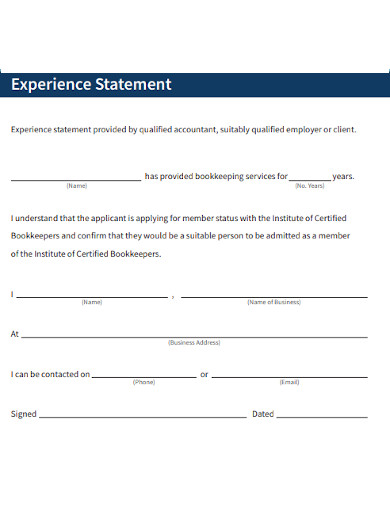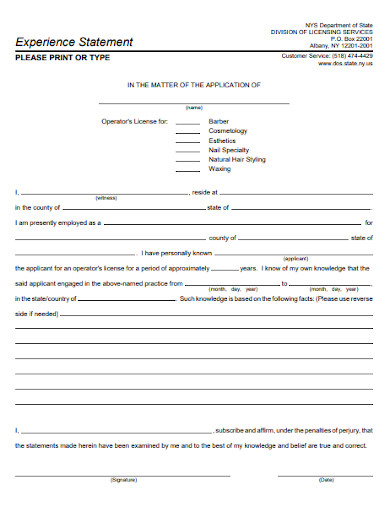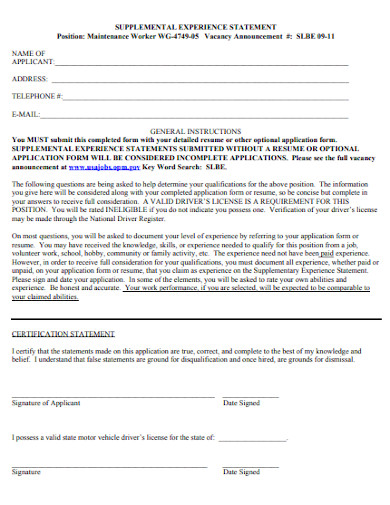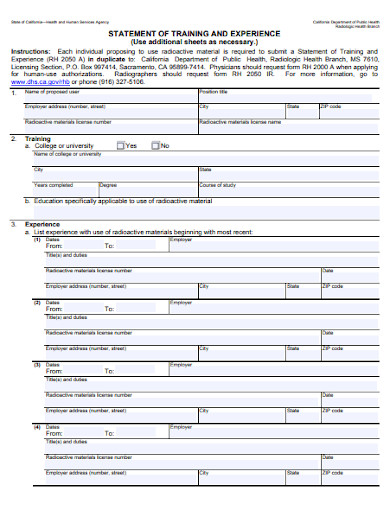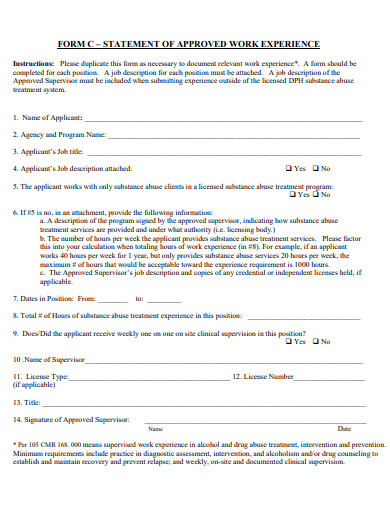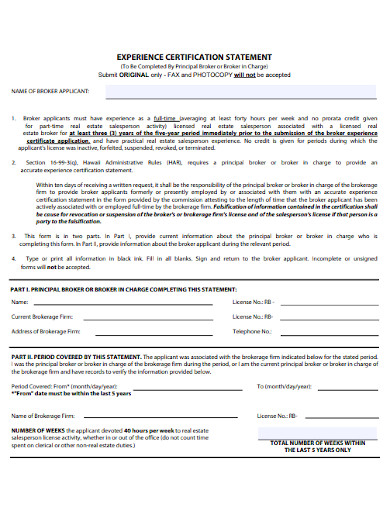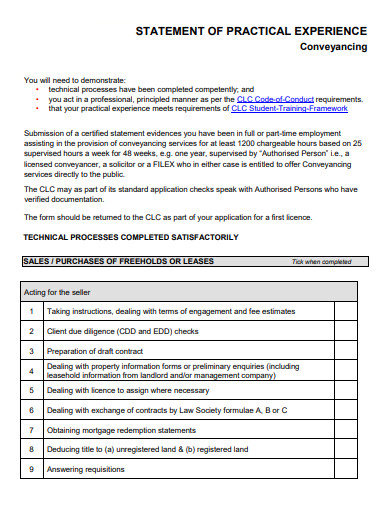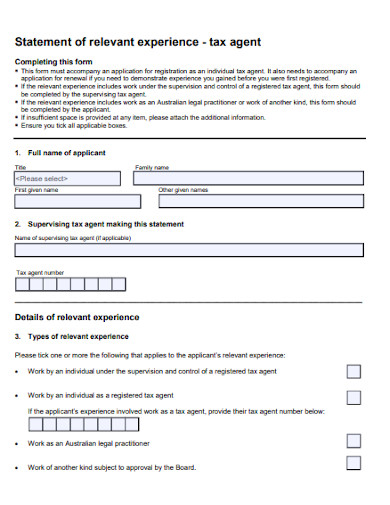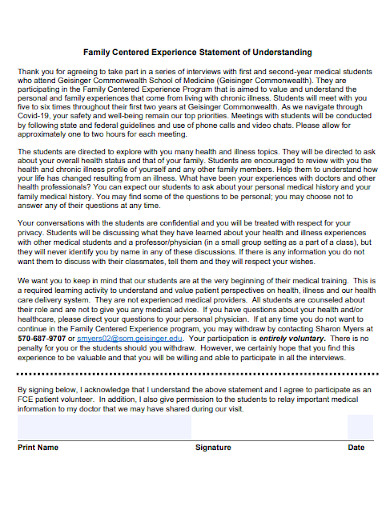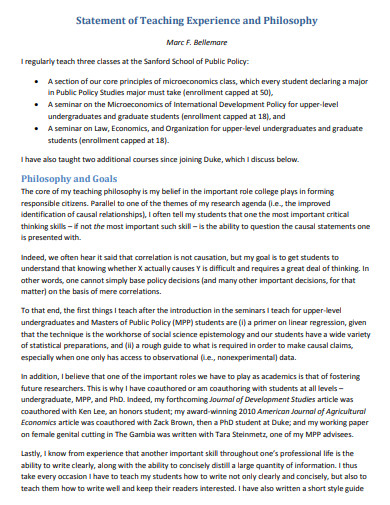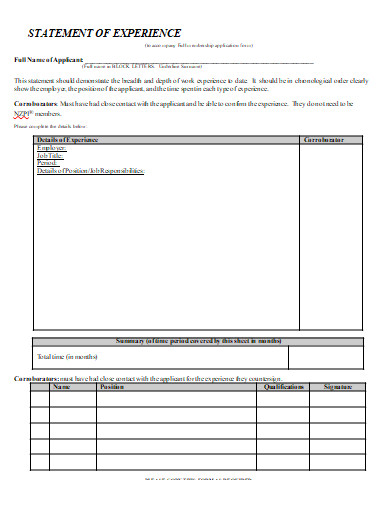10+ Experience Statement Examples to Download
Graduating students are often told that when they want to get the best job, they must also have the best education under their belt. This can be significantly true, but you must also have experience under your belt as well. We are told that work experience can be the best teacher, and it is true. For those who already have a lot of experience with the job field, they may already know how this would work. But even those who already do often have a hard time expressing their experience in their curriculum vitae. Employers often check for the experience statement, regardless of what work you may have or you are applying for. With that being said, let’s head on and take a look at how you can write a good experience statement with these examples below.
10+ Experience Statement Examples
1. Experience Statement Template
2. Sample Experience Statement
3. Supplemental Experience Statement
4. Statement of Training and Experience
5. Statement of Approved Work Experience
6. Experience Certificate Statement
7. Statement of Practical Experience
8. Statement of Relevant Experience
9. Family Centered Experience Statement
10. Statement of Teaching Experience
11. Statement of Experience in DOC
What Is an Experience Statement?
When we think of experience statements, we think of a lengthy essay about our past experiences working for different companies. An experience statement is a description found mainly at the bottom of the list of your experiences. This statement consists mainly of two to three sentences and a maximum of five sentences. However, there are some who may be asking for a whole page of your experience statement. The sentences are mainly about what your work is about, how long you have worked there, how you manage it, what are your skills, and what learnings or insights you have gained while working for this particular company or business. The sole purpose of this experience statement is to let your employer know the history of your work experience and the skills you may have learned while working there.
How to Write an Experience Statement?
Where do you begin with explaining the experience statement of your previous work? Many applicants often fail to add an experience statement, believing that the employer would not read about their skills or the history of their work. To avoid that from happening to you, take a look at these steps to help you get started.
1. Write a Catchy Introduction
To catch a reader’s attention, you must also have a catchy introduction but not to the point where you may simply be talking about something random that their attention would not be drawn to your work experience. Write an introduction that would immediately grab the reader and slide right into your work experiences.
2. State Your Work Experiences
State all the work experiences you have had that are related to or closely related to the current job you are applying for. Of course, there are some who may as well write the entire work experience, and that can be done as well. However, your employer may wonder about the other previous work experiences that you have that are not related to the current job you are applying for. To avoid any confusion, it is best to only write the ones that are related to or closely related to the job you are applying for.
3. Add Some Details
Details are important when writing your experience statement. Dive right in about what you did in your previous employment, the skills, the lessons you learned, and the seminars and workshops you have attended.
4. Avoid Writing Anything Negative About Previous Work Experiences
Many people may have had at some point in their lives want to write something bad about their experiences in their previous jobs. But that is something you need to avoid doing at all costs. Not only are you writing something bad about a company or a place you have worked before, but it also gives the employer the impression that you are not a professional. The chances of getting hired would become less and less.
5. End with a Positive Conclusion
End your experience statement with a positive conclusion or with a positive statement. Avoid ending it on a negative note. Your employers are going to be taking their time reading your statement. Let it be best to end it with something good rather than something bad.
FAQs
What is an experience statement?
An experience statement is an essay that you write about your previous job experience when you are applying for a new job.
What can you expect in an experience statement?
What your employers would be expecting in an experience statement is a summary of your experiences that are related to the job you are applying for, the skills you have learned from previous employment, and the certificates from workshops and seminars if they are applicable.
How long is an experience statement?
The length of an experience statement is about a page long. When you have more than one or two experiences working, and a lot of skills to add, it would be expected to be a page long.
It goes without saying, when you are going to be applying for a job, you would always be placing your experiences in it as well. Employers would be seeking out your experiences first in order to see if you have enough to get the job you are applying for.



